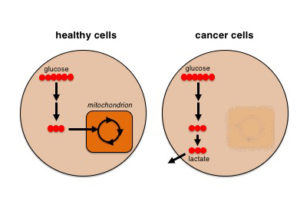One of the hallmarks of cancer is a change in cellular metabolism, a series of chemical reactions so fundamental to life that their alteration makes cancer cells seem creepily malevolent.
Healthy cells take in blood sugar (glucose molecules), which they break down to extract energy. This happens in two phases — one phase that takes place in the cytoplasm and a subsequent phase that occurs inside cellular compartments called mitochondria.
Cancer cells are thought to mostly skip the high-energy producing mitochondrial phase, compensating for the energy they forgo by revving up the first phase and breaking down glucose rapidly to secrete large quantities of lactate — a form of partially digested glucose that has long been regarded as a “waste product.”
Some parts of this hypothesis must be true because cancer cells do soak up more glucose than healthy cells; this increased glucose uptake is significant enough to be the basis of an imaging technique used to diagnose cancer in the clinic.
On the other hand, it has been hard to understand how cells could afford to discard most of the energy and substance that can be produced from glucose, like royal food testers taking only one bite of each “dish.”
“It’s been a very confusing topic in cancer research for a long time — seemingly paradoxical — that cancer cells could be so wasteful,” said Gary J. Patti, associate professor of chemistry in Arts & Sciences at Washington University in St. Louis.
In the Sep. 12 advance online issue of Nature Chemical Biology, Patti and then-doctoral student Amanda (Ying-Jr) Chen describe the surprising results of a seemingly simple experiment. Originally undertaken to test a new methodology, their findings unexpectedly challenged this notion of cancer metabolism.
By studying lactate, they showed that cancer cells can run their energy production differently than thought. They have the ability to import the “waste product” lactate into the mitochondria where the rest of the glucose energy can then be extracted.
“If you look up lactate in our undergraduate biochemistry textbook, it says that lactate is secreted as a waste product,” Patti said, “but our research shows that it doesn’t have to be; it can be used productively.”
The Warburg puzzle
Most of the energy that cells need to live is produced in the mitochondria, the so-called power plant of the cell. Only 5 percent of glucose’s energy can be extracted in the cytoplasm, whereas 95 percent can be extracted in the mitochondria. To produce energy in the mitochondria, oxygen is required.
In 1924, the German physiologist Otto Warburg discovered that cancer cells tend to ferment glucose into lactate even in the presence of oxygen. They apparently shift from metabolizing glucose in the mitochondria to breaking down most glucose in the cytoplasm.
 This observation, called the Warburg effect, has long puzzled cancer researchers. Why would cells that are rapidly growing switch to a form of metabolism that generates less energy? What advantage does it confer?
This observation, called the Warburg effect, has long puzzled cancer researchers. Why would cells that are rapidly growing switch to a form of metabolism that generates less energy? What advantage does it confer?
Despite many efforts to resolve this issue, it never really went away. “If you look at metabolic maps in the literature,” Patti said, “there’s usually only an arrow showing lactate going outside of the cell. It’s only a single arrow, but it makes a big difference in how we think.”
A dead end that wasn’t
To study metabolism in an unbiased way, Patti’s lab puts tags (isotope labels) on nutrients so that they can track what becomes of them when they are metabolized by cells.
“We developed this technology,” Patti said. “And we thought, ‘OK, what’s the first thing we should test it on?’ We decided an obvious molecule to start with was lactate, which is often called a dead end. We expected that giving cancer cells this tag would demonstrate that our technology works, because we wouldn’t see much of it converted into other molecules.”
But when Chen did the experiment, it didn’t turn out as expected. “We saw thousands of labeled signals,” she said. “Nearly every lipid in the cell ended up tagged. It was very unexpected and exciting.” The cells weren’t just extracting extra energy from lactate, they were then using its atoms to make other important building blocks essential to cancer cell growth.
“It’s a big transition,” Patti said. “We’re going from saying something is thrown away to saying that it is used to make effectively an entire class of molecules in cancer cells.”
Since the finding was so startling, the team ran a series of experiments to ensure that the lactate was actually going into the mitochondria. The experiments not only confirmed that lactate can be transported into the mitochondria, but also demonstrated that an enzyme within the mitochondria metabolizes lactate to produce energy and cellular building blocks.
Having your cake and eating it too
So why waste effort converting glucose into lactate if it is just going to be transported into the mitochondria anyway?
When cells metabolize glucose in the cytoplasm, it produces electrons. They have to put the electrons somewhere, or the tightly regulated metabolic reactions stop. Healthy cells move the electrons into the mitochondria, but cancer cells make electrons faster than transport can keep up. This forces cancer cells to stick the electrons on lactate and excrete it, or so it was thought.
“We think what we have found is a work-around,” Patti said. Cancer cells stick electrons on lactate, but that doesn’t mean the precious nutrient has to be wasted.It can go into the mitochondria.
“It’s a case of having your cake and eating it too,” he said.

